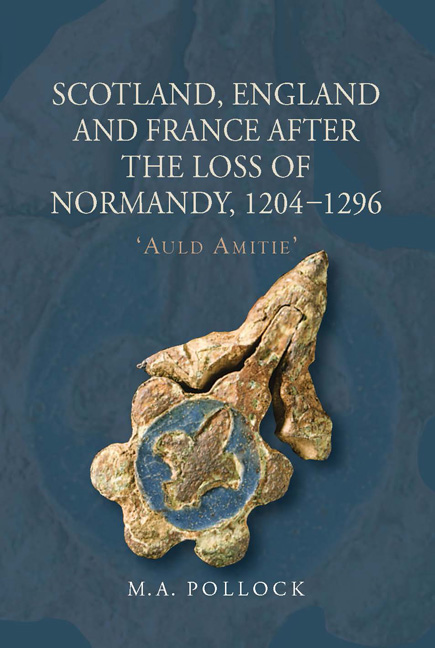Book contents
- Frontmatter
- Dedication
- Contents
- List of Genealogical Tables
- Acknowledgements
- List of Abbreviations
- Introduction
- 1 King John and Scotland after the Loss of Normandy
- 2 The Scots and the First Barons' War
- 3 Alexander and Henry III
- 4 War and Marriage: The French Dimension
- 5 The ‘Auld Alliance’: A New Beginning
- Conclusion
- Bibliography
- Index
3 - Alexander and Henry III
Published online by Cambridge University Press: 05 May 2015
- Frontmatter
- Dedication
- Contents
- List of Genealogical Tables
- Acknowledgements
- List of Abbreviations
- Introduction
- 1 King John and Scotland after the Loss of Normandy
- 2 The Scots and the First Barons' War
- 3 Alexander and Henry III
- 4 War and Marriage: The French Dimension
- 5 The ‘Auld Alliance’: A New Beginning
- Conclusion
- Bibliography
- Index
Summary
Early Days
After 1204, the majority of the aristocracy of France and England explicitly served different royal lords and fought on opposing sides, which should have simplified loyalties. However, the English kings did not relinquish the hope of regaining their French lands. Henry III sent or led expeditions in 1225, 1230–31, 1244–45, and throughout the 1250s until the Treaty of Paris in 1259. Furthermore, even though the Anglo-French nobility of 1204 had for the most part surrendered any hope of regaining their former French fees, particularly after Louis's defeat in 1217, the psychological bond with their kin and patronage networks on the Continent took more than a generation to wane. The same was not true in Scotland however.
There were far fewer Anglo-French Scottish lords who still had lands and titles in France after 1204. Most of the king of Scotland's men had migrated in the twelfth century as younger sons of Anglo-French lords in England. They did not have the same attachment to the French world. By the end of the First Barons' War in 1217 most of the contact between Scotland and France was on a diplomatic level except for a very few men like Robert de Ros and Robert de Quincy. In Scotland, it was overall easier to detach from French interests because most of the Anglo-French Scottish lords were invested in English and Scottish affairs, not in French. There was, however, still interaction between the Scots and French in particular areas of France, like Champagne, because of the emigration of some of King William's natural children and because of marital negotiations in the royal family.
Developments in England between 1217 and 1237 brought the Scottish court closer to England. When the Barons' War ended, King Alexander was initially cautious in his negotiations with England primarily because it was unclear that he would gain the lands in Northumberland promised to him in Magna Carta.
- Type
- Chapter
- Information
- Scotland, England and France after the Loss of Normandy, 1204–1296'Auld Amitie', pp. 85 - 129Publisher: Boydell & BrewerPrint publication year: 2015



